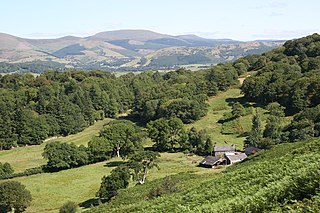
Ceredigion ( ), historically Cardiganshire, is a county in the west of Wales. It borders Gwynedd across the Dyfi estuary to the north, Powys to the east, Carmarthenshire and Pembrokeshire to the south, and the Irish Sea to the west. Aberystwyth is the largest settlement and, together with Aberaeron, is an administrative centre of Ceredigion County Council.
David Davies may refer to:

Sir John Morris-Jones was a Welsh grammarian, academic and Welsh-language poet.

Llanddewi Brefi is a village, parish and community of approximately 500 people in Ceredigion, Wales. The village is notable for the famous Synod of Brefi held here in the sixth century. A number of miraculous events are said to have occurred during the synod, most notably by Saint David Welsh: Dewi Sant, patron saint of Wales. Today, it is one of the largest parishes in Wales and lies 7 miles (11 km) north-east of Lampeter between Tregaron and Llanfair Clydogau. It is in the electoral ward of Llangeitho.

Sir John Rhŷs, was a Welsh scholar, fellow of the British Academy, Celticist and the first professor of Celtic at Oxford University.
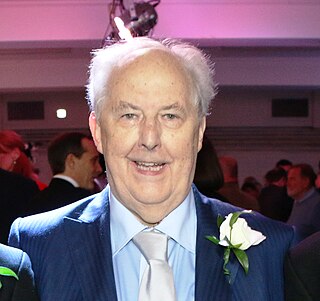
David Benjamin Rees is a Welsh and English-language publisher, author, lecturer and minister in the Presbyterian Church of Wales since 1962. He is a leader of the Welsh community in Liverpool, and heads one of the city's five remaining Welsh chapels. His small publishing house, Modern Welsh Publications Ltd, was established in 1963 and from 1963 to 1968 it operated from Abercynon in the Cynon Valley of South Wales. Since 1968 it has operated from Allerton, Liverpool and is the only Welsh language publishing house still operating in the city of Liverpool.
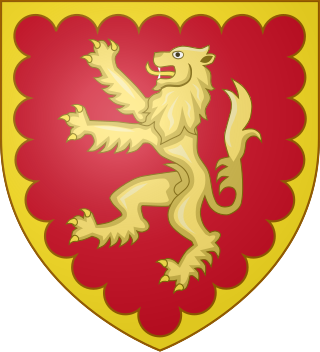
The Royal House of Dinefwr was a cadet branch of the Royal House of Gwynedd, founded by King Cadell ap Rhodri, son of Rhodri the Great. Their ancestor, Cunedda Wledig, born in late Roman Britain, was a Sub-Roman warlord who founded the Kingdom of Gwynedd during the 5th century, following the Anglo-Saxon settlement of Britain. As Celtic Britons, the House of Dinefwr was ruling before the Norman conquest, having to fight with their neighbors such as the Celtics, Anglo-Saxons and Vikings, before struggling with the Normans afterwards. Many members of this family were influential in Welsh history, such as Hywel Dda, who codified Welsh law under his rule, and achieved the important title of King of the Britons, or Lord Rhys, Prince of Wales, who rebelled against Richard the Lionheart, and became one of the most powerful Welsh leaders of the Middle Ages.
William Evans F.R.C.P.(Lond.), Hon. D.Sc.(Wales) was a distinguished Harley Street cardiologist. He was a grandson of "the Welsh Swagman", Joseph Jenkins, whose voluminous Australian diaries over 25 years (1869-1894) he edited and published as excerpts in 1975.

Soar-y-mynydd or Soar y mynydd is a Calvinist Methodist chapel near the eastern extremity of the large parish of Llanddewi Brefi in Ceredigion. It is claimed to be the remotest chapel in Wales. The name means "Zoar of the mountain", Zoar being the place where Lot found refuge during the destruction of Sodom and Gomorrah.

William Frederick Chambers, KCH (1786–1855) was a British physician. He became physician in ordinary to Queen Adelaide of Saxe-Meiningen and King William IV of England.
This article is about the particular significance of the year 1792 to Wales and its people.

James Rhys Jones (1813–1889), usually known as Kilsby Jones, was a Welsh nonconformist minister, writer and lecturer.
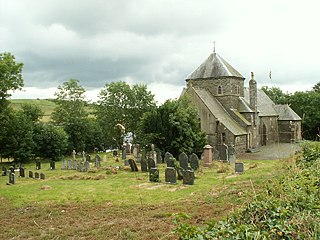
Bont Goch is a village in Ceredigion, Wales, 2 miles (3.2 km) northeast of Aberystwyth. With Talybont, it is in the community of Ceulanamaesmawr.
Saint Gwrddlew or Gwrtheli, Gartheli, was a pre-congregational saint of 5th century medieval Wales.
The seventh election for Cardiganshire County Council took place in March 1907. They were preceded by the 1904 election and followed by the 1910 election
David Edwards (1660-1716) was an Independent Minister who lived at Abermeurig in the Vale of Aeron. He was a Landed proprietor, owning property in Nantcwnlle and Llanddewi Brefi. He was a friend of John Jones, Llwynrhys who was the leading Independent in Central Cardiganshire. Edwards was a competent scholar and was ordained as assistant minister to David Jones at Caeronnen, Cellan, Crug y Maen, Llwyn Rhys and Cilgwyn.
St David's Church is a Grade II* listed medieval church in the Welsh village of Llanddewi Brefi, 3 miles south of Tregaron in the county of Ceredigion.
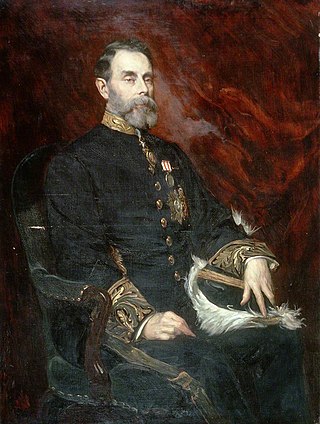
Sir Robert Henry Davies,, known as Sir Henry Davies, was a British colonial official in British India, who served as Lieutenant Governor of the Punjab.
John D. Davies was a Welsh priest. He was born in Llanddewi-Brefi, and attended school in Lampeter, before moving to study at Queens' College, Cambridge, in 1820. Following his ordination into the Church of England in Norwich, he became rector of St. Pancras, Chichester. In 1840 he moved to Gateshead, Durham, before in 1853 becoming Honorary Canon of Durham Cathedral. He remained there until retirement in 1860.
The sixteenth election to Cardiganshire County Council took place in March 1937. It was preceded by the 1934 election and, after those scheduled for 1940 and 1943 were postponed due to the Second World War, by the 1946 election.











